Last Updated: 2 years ago
Cats are curious creatures that love to explore, so it’s no surprise they’ll sometimes sneak a nibble of your food. But can cats eat carrots?
Many cat owners wonder if this crunchy vegetable is safe for their furry friends or if there could be risks involved with giving them a treat from the dinner table.
Carrots offer many potential nutritional benefits for cats, but not all cats may react positively when trying something new.
So let’s dive in!
Nutritional Benefits of Carrots for Cats
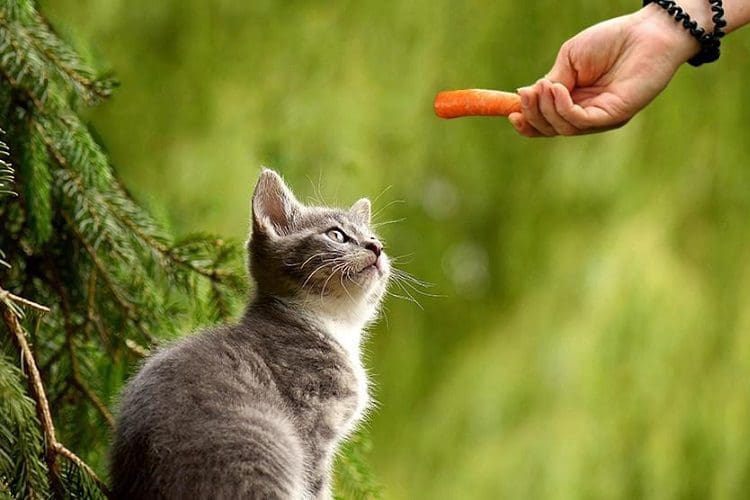
Carrots are a great source of nutrition for cats. They contain vitamins, minerals, antioxidants, and fiber that can help keep cats healthy.
With the right preparation and serving size, carrots can be a great addition to your cat’s diet.
Here’s a closer look at the nutritional benefits of carrots for cats:
Vitamins and Minerals
Carrots are an excellent source of Vitamin A which helps support eye health in cats. They also provide Vitamin C, B6, K1, potassium and magnesium.
All these nutrients work together to support overall cat health by helping with digestion and keeping their immune system strong.
Antioxidants
Carrots contain powerful antioxidants like beta-carotene which can help protect against free radical damage in cats’ bodies.
This is important because free radicals can cause cell damage over time leading to chronic diseases such as cancer or heart disease in cats if left unchecked.
Fiber
Fiber is essential for good digestive health in both humans and animals alike.
Carrots are a great source of dietary fiber which helps keep your cat’s digestive tract running smoothly while also providing them with energy from carbohydrates found within the vegetable itself.
The fiber content also makes carrots filling so they won’t be tempted to overeat other foods that may not be as nutritious for them.
How to Feed Carrots to Your Cat
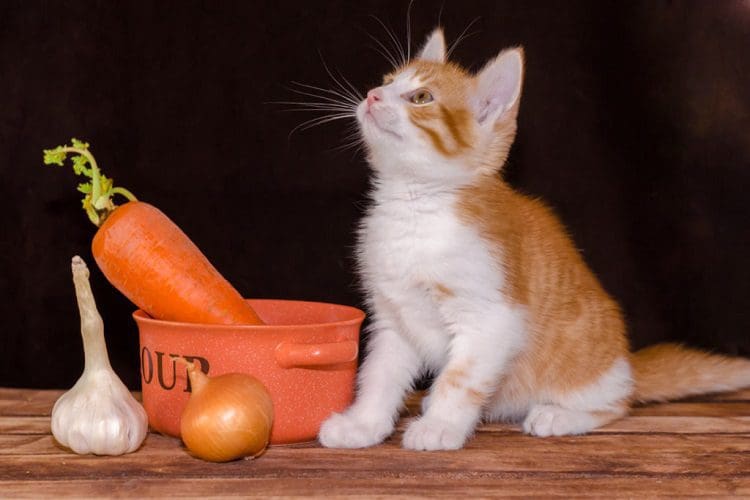
When it comes to feeding your cat carrots, the type of carrot you choose is important. For example, baby carrots are too small for cats and can be a choking hazard.
Instead, look for full-sized carrots that have been peeled and cut into smaller pieces. This will make them easier for your cat to chew and digest.
Preparing the carrot is also key in ensuring that your cat enjoys its mealtime experience with this vegetable.
Start by washing the carrot thoroughly under cold running water before peeling off any remaining skin or dirt from its surface.
Once peeled, cut the carrot into small cubes or slices so they’re easy for your cat to eat without having to bite down on large chunks of food at once.
Serving size and frequency guidelines should also be taken into consideration when feeding carrots to cats as part of their regular diet plan.
As a general rule of thumb, one teaspoon per day per 10 pounds (4 kg) of body weight is recommended; however, always consult with your veterinarian if you have questions about how much food is appropriate for your pet’s specific needs and lifestyle requirements.
Try introducing new foods slowly over time rather than all at once so that you can monitor how well they’re being tolerated by your feline friend before increasing portion sizes further down the line if needed.
It is important to choose the right type of carrot, preparing it correctly, and following appropriate serving size guidelines.
Potential Risks of Feeding Carrots to Cats
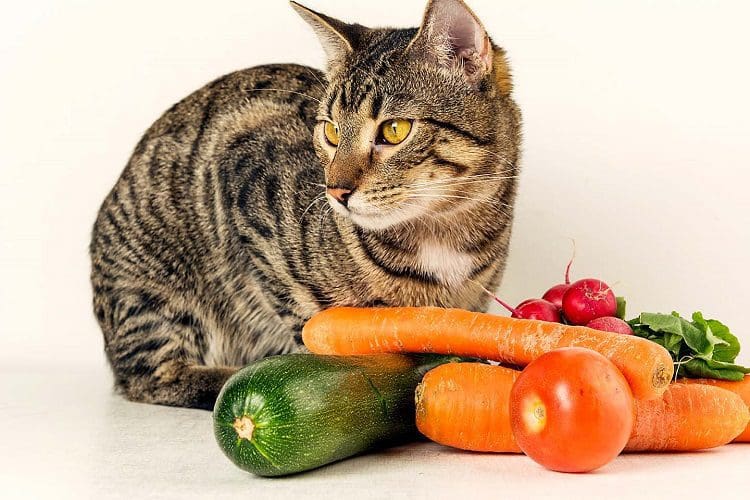
Feeding carrots to cats can be a great way to provide them with essential vitamins and minerals, but there are some potential risks associated with this practice.
Although carrots can be a safe and healthy snack for cats, it is important to consider the potential risks associated with feeding them such as allergies, overfeeding, and choking hazards.
Cat owners should understand these risks before introducing carrots into their pet’s diet.
Allergies and Intolerances
Cats can have allergies or intolerances to certain foods, including carrots. If your cat has an allergic reaction after eating carrots, it may cause vomiting, diarrhea, or other digestive issues.
To avoid any adverse reactions from food allergies or intolerances, introduce new foods slowly and in small amounts so that you can monitor your cat’s reaction carefully.
Overfeeding and Weight Gain Concerns
Carrots are high in fiber which helps keep cats feeling full longer; however too much of a good thing can lead to weight gain if not monitored properly.
It is important to follow the serving size guidelines when feeding your cat anything new as overfeeding could result in unwanted weight gain or obesity-related health problems down the line.
Choking Hazards
Carrots should always be served cooked rather than raw as they pose a choking hazard due to their hard texture when uncooked.
Make sure that the carrot pieces you serve your cat are cut into small enough sizes so that they don’t present a risk of choking while being eaten by your pet.
Alternatives to Feeding Carrots to Cats
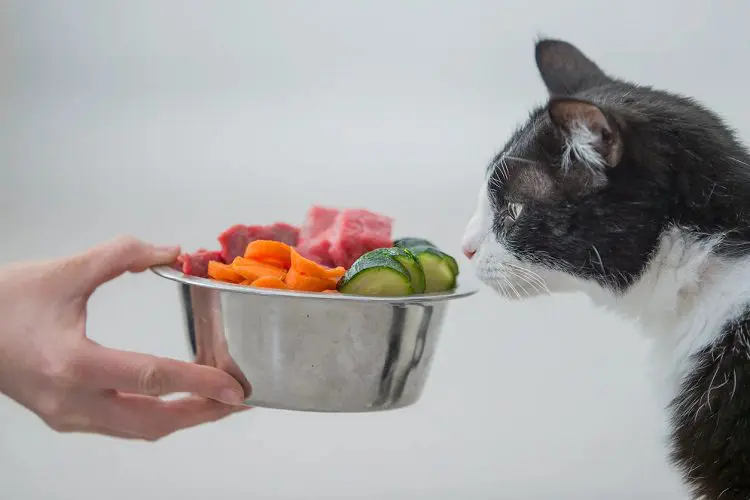
When it comes to feeding your cat, there are plenty of alternatives to carrots that you can explore.
From commercial treats and snacks to homemade recipes, you have a variety of options available.
No matter what type of treat you choose for your cat, it is important not to overfeed them or give too many treats at once since this could lead to weight gain issues down the line.
Start slow by introducing small portions first then gradually increase if needed until you find the right balance between nutrition and taste.
Other Vegetables Suitable for Cats
If you’re looking for an alternative to carrots, other vegetables like green beans or peas make excellent options.
These veggies contain essential nutrients like vitamins A and C as well as iron and calcium which help keep cats healthy.
Just remember not to feed them raw; always cook these vegetables before giving them to your cat.
Commercial Cat Treats and Snacks
For those times when you don’t have the time or energy to prepare fresh food for your pet, commercial treats can be a great solution.
There is an abundance of high-quality snacks available specifically designed with cats in mind that provide all the nutrition they need without any added preservatives or fillers.
Homemade Treats for Cats
Making homemade treats is another way to give variety in their diet while still providing nutritious meals that cats love.
Try making simple recipes such as tuna patties using canned tuna mixed with oats or egg yolks blended with cooked chicken breast – both delicious options that will satisfy even the pickiest eater.
Tips for Introducing New Foods to Your Cat’s Diet
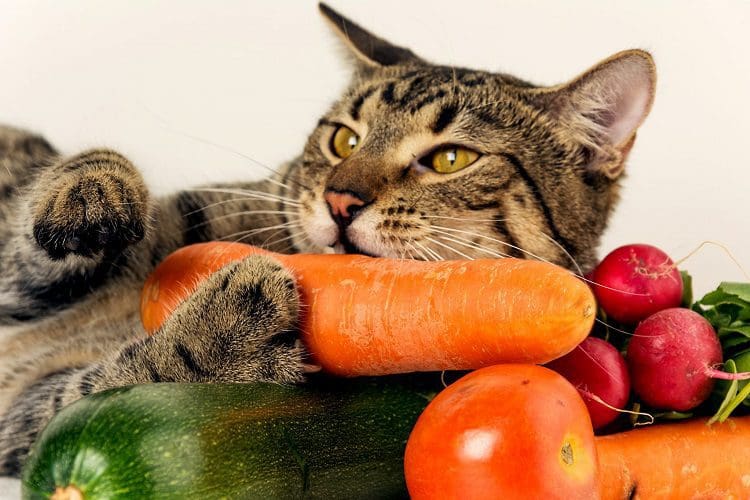
When introducing new foods to your cat’s diet, it is important to do so safely and effectively.
Starting slowly with small portions and monitoring your cat’s reaction carefully can help ensure that the transition goes smoothly.
Offering variety in moderation can keep your cat happy and healthy.
Start Slow with Small Portions
When introducing new food to your cat, start by giving them only a tiny portion of the food at first.
This will allow you to gauge their reaction without overwhelming them or causing digestive issues.
If they seem interested in the food, gradually increase the portion size over time until they are eating a full serving of the new item regularly.
Monitor Your Cat’s Reaction Carefully
As you introduce different types of food into your cat’s diet, be sure to watch for any signs of discomfort or adverse reactions such as vomiting or diarrhea.
If these occur after feeding them something new, discontinue use immediately and consult with your veterinarian if necessary.
Conclusion
Carrots can be a great addition to your cat’s diet as long as you take the necessary precautions. Make sure to introduce new foods slowly and monitor your cat for any adverse reactions.
Carrots are full of vitamins and minerals that can help keep your cat healthy, but it is important to remember that cats should not eat too many carrots in one sitting.
With proper care and moderation, you can safely add carrots into your cat’s diet so they can enjoy all the nutritional benefits this vegetable has to offer!
Try mixing up their meals by incorporating different flavors and textures into each mealtime routine so that they get all the nutrients needed for optimal health while still enjoying their favorite treats.
Resources:
